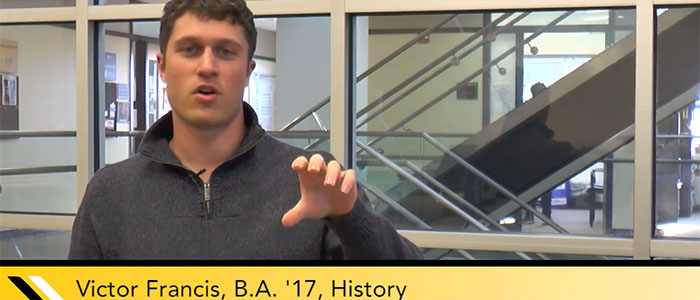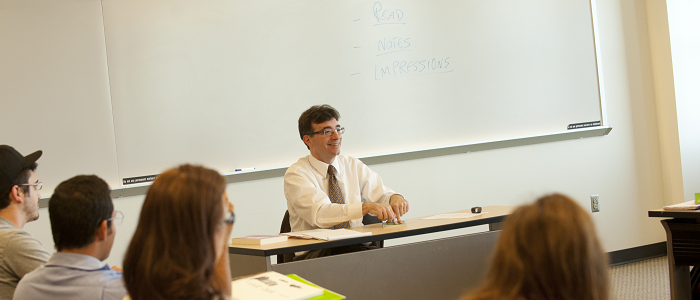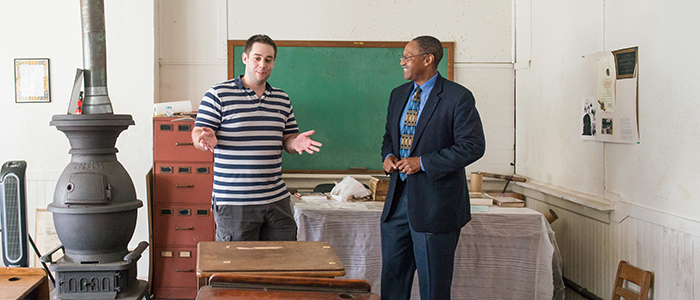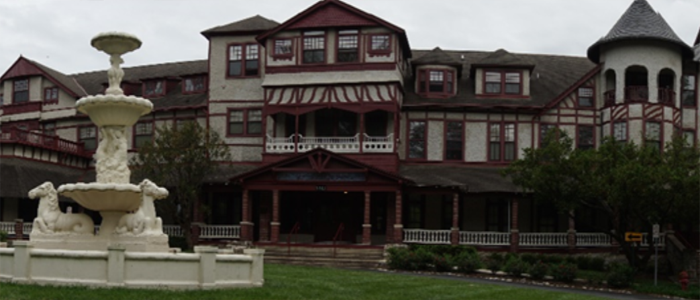With an emphasis on international historical perspectives, UMBC’s Bachelor of Arts in History at the Universities at Shady Grove is designed to provide a broad overview of the human past by exploring how different peoples have built their worlds and made sense of them over time. UMBC History Alumni have enjoyed success in business, government, education, law, and public policy—and as entrepreneurs.
The History Program also offers a minor in public history, a field which brings together historians with partners and audiences to engage in productive conversations about the value and usefulness of the past. The public history minor introduces students to a wide breadth of practices, including historic sites documentation, cultural resources management, historic preservation planning, oral history, museum studies, and digital history. All of our students are encouraged to engage in active learning and research experiences in the many museums, historical societies and government agencies in the Washington-Baltimore metropolitan area.
Students enrolling in the Bachelor of Arts program in History at UMBC-Shady Grove will complete approximately two years of full-time study prior to entry and complete the remainder of their upper-level credits with UMBC-Shady Grove. Students may transfer a maximum of 60 credits from a community college and 90 credits from a four-year school to UMBC.
Learn More About the Program
Suggested Transfer Pathways
UMBC-Shady Grove has developed Suggested Transfer Pathways (STPs) for students at Montgomery College (updated version coming soon) and Frederick Community College (updated version coming soon) who may be interested in transferring into any one of our undergraduate programs. In the meantime, please make use of our General Suggested Transfer Pathway. Our STPs provide an academic plan of action for transfer and an outline of the recommended transfer coursework specific to each of our academic programs.
Please note that the Suggested Transfer Pathway is not intended to serve as an official articulation agreement.
Recommended Prerequisites
UMBC-Shady Grove provides upper-level coursework for transfer students who have completed or are near completion of lower-level course requirements. As such, only upper-level courses are offered at UMBC-Shady Grove specific to each of our undergraduate programs. Most students transferring into UMBC-Shady Grove have completed at least 45-50 credits prior to transferring and many students have earned their Associate Degree. The History Department strongly encourages you to complete the following courses prior to transfer:
- 3 history classes at the 100- or 200-level with at least one in U.S. history and at least one in non-U.S. history
- English Composition
In addition to the above courses, the following courses must be completed prior to graduation from UMBC. Ideally, a student will complete as many of the courses below as possible prior to transferring to UMBC-Shady Grove. Given that these courses are lower-level, they must be taken at an institution other than UMBC-Shady Grove:
- 3 Arts and Humanities courses (from at least two different disciplines)
- 3 Social Science courses (from at least two different disciplines)
- College Algebra or Statistics
- 2 Science courses (at least one must have a lab component)
- World Language Intermediate-Level (consult advisor about exceptions)
Questions about the History Program? Please contact Dr. Andrew Nolan, Program Director, at nolan@umbc.edu or 301-738-6182. Watch the short video below to meet Dr. Nolan.
Major Requirements
Students pursuing a bachelor's degree must complete university requirements. Progress toward completion of university requirements is evaluated by means of the Transfer Credit Report (TCR) which is available online to students via myUMBC once admitted to the university. Progress toward major completion is evaluated in the academic departments. University requirements include:
General Requirements:
- Minimum of 120 academic credits
- Minimum of 2.0 grade point average
- 45 Upper Level Credits
Major Requirements:
Major Requirements Specific to History
Additional Advising Resources
Additional advising resources are available here. For more information on degree requirements, please contact the UMBC-Shady Grove Coordinator of Undergraduate Recruitment and Advising at 301-738-6281.
Public History Minor
UMBC’s Public History minor (PDF) at the Universities of Shady Grove explores history at work in the present-day world. Students work with community partners and historical institutions on meaningful real-world projects. Through these collaborative efforts, students are able to problem-solve, employ critical thinking, and develop strong organizational, communicative, and strategic planning skills. The Public History minor introduces students to professional practices such as historic preservation, cultural resources management, museum studies, state and local history, and digital history. Site-based internships help students develop marketable skills and chart their own professional paths (video) as public historians.
Minor Requirements
In addition to completing a major, UMBC students also have the option of completing a minor to supplement their coursework. The minors listed below are available to all students at UMBC-Shady Grove. Please note that all social work majors are required to complete a minor of their choosing.
Please click on the links below for University requirements specific to minors requiring coursework available at UMBC-Shady Grove. Other minor options may be explored as well. You should meet with your academic advisor to discuss how your minor of interest may best fit your degree plan.
Minor Requirements:
Faculty
Dr. Andrew Nolan
Program Director
Department: History
Phone: 301-738-6182
Email: nolan@umbc.edu
Office: Bldg III, Room 4155
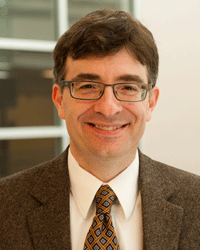 Dr. Andrew Nolan is the History Program Director for UMBC at the Universities at Shady Grove. His teaching focuses on modern U.S. history, cultural and constitutional history, and historical writing and research methods. He is currently working on a book that explores the 1925 Scopes trial as a symbolic opening in an ongoing debate over the nature of the modern American nation. This research also resulted in an article titled “Making Modern Men: The Scopes Trial, Masculinity and Progress in the 1920s United States,” which he published in the April 2007 edition of Gender & History .
Dr. Andrew Nolan is the History Program Director for UMBC at the Universities at Shady Grove. His teaching focuses on modern U.S. history, cultural and constitutional history, and historical writing and research methods. He is currently working on a book that explores the 1925 Scopes trial as a symbolic opening in an ongoing debate over the nature of the modern American nation. This research also resulted in an article titled “Making Modern Men: The Scopes Trial, Masculinity and Progress in the 1920s United States,” which he published in the April 2007 edition of Gender & History .
He is currently focusing on developing the program at Shady Grove, which shepherds students through the third- and fourth-years of their college careers and provide them with the UMBC history degree grounded in critical thinking, analytical reading, and clear writing. In his spare time, he will continue to research his next project, which explores popular representations of human evolution—and dinosaurs—in U.S. culture.
Melissa Blair
Lecturer and Public History Minor Coordinator
Department: History
Phone: 301-738-6283
Email: mfblair@umbc.edu
Office: Bldg III, Room 4131
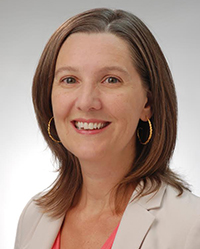 Melissa Blair studies the history of architecture, landscapes, and material culture. Her research and teaching relate to the cultural and architectural history of eighteenth- and nineteenth-century America and to the field of public history. She is co-author with Richard Striner of Washington and Baltimore Art Deco: A Design History of Neighboring Cities (Johns Hopkins University Press, 2014). Prior to joining the Department of History, she worked for more than 15 years as an architectural historian and historic preservationist for a variety of public, private, and nonprofit organizations. Her current research focuses on the Mid-Atlantic region’s rural buildings and landscapes, the farming patterns that shaped them, and their preservation. She is responsible for the public history minor for UMBC’s B.A. in history at the Universities at Shady Grove.
Melissa Blair studies the history of architecture, landscapes, and material culture. Her research and teaching relate to the cultural and architectural history of eighteenth- and nineteenth-century America and to the field of public history. She is co-author with Richard Striner of Washington and Baltimore Art Deco: A Design History of Neighboring Cities (Johns Hopkins University Press, 2014). Prior to joining the Department of History, she worked for more than 15 years as an architectural historian and historic preservationist for a variety of public, private, and nonprofit organizations. Her current research focuses on the Mid-Atlantic region’s rural buildings and landscapes, the farming patterns that shaped them, and their preservation. She is responsible for the public history minor for UMBC’s B.A. in history at the Universities at Shady Grove.
